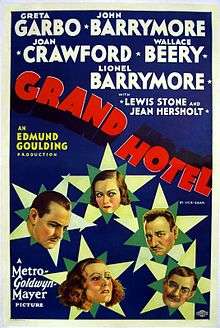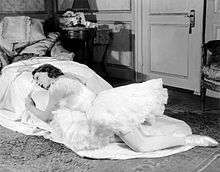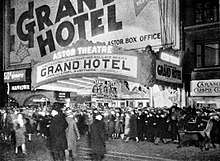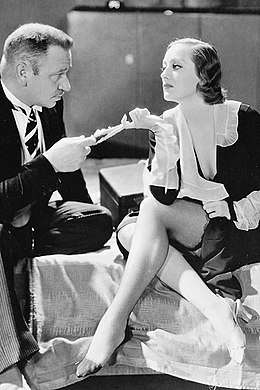Grand Hotel (1932 film)
Grand Hotel is a 1932 American pre-Code drama film directed by Edmund Goulding and produced by Metro-Goldwyn-Mayer. The screenplay by William A. Drake is based on the 1930 play of the same title by Drake, who had adapted it from the 1929 novel Menschen im Hotel by Vicki Baum. To date, it is the only film to have won the Academy Award for Best Picture without being nominated in any other category.
| Grand Hotel | |
|---|---|
 Original poster | |
| Directed by | Edmund Goulding |
| Produced by | Irving Thalberg |
| Written by | William A. Drake |
| Based on | Grand Hotel (play) 1930 by William A. Drake and Menschen im Hotel 1929 by Vicki Baum |
| Starring | Greta Garbo John Barrymore Joan Crawford Wallace Beery Lionel Barrymore Lewis Stone Jean Hersholt |
| Music by | William Axt Charles Maxwell |
| Cinematography | William H. Daniels |
| Edited by | Blanche Sewell |
Production company | |
Release date |
|
Running time | 112 minutes |
| Country | United States |
| Language | English |
| Budget | $750,000[1] |
| Box office | $2.3 million[2] |
The film was remade as Week-End at the Waldorf in 1945, and also served as the basis for the 1989 stage musical Grand Hotel. Another remake, to be directed by Norman Jewison, was considered in 1977 which was to take place at Las Vegas' MGM Grand Hotel, but the project eventually fell through.[3]
Grand Hotel has proven influential in the years since its original release. The line "I want to be alone", famously delivered by Greta Garbo, placed number 30 in AFI's 100 Years...100 Movie Quotes. In 2007, the film was selected for preservation in the United States National Film Registry by the Library of Congress for being "culturally, historically, or aesthetically significant".
Plot

Doctor Otternschlag, a disfigured veteran of World War I and a permanent resident of the Grand Hotel in Berlin, observes, "People coming, going. Nothing ever happens" — after which a great deal transpires.
Baron Felix von Gaigern, who squandered his fortune and supports himself as a card player and occasional jewel thief, befriends Otto Kringelein, a dying accountant who has decided to spend his remaining days in the lap of luxury. Kringelein's former employer, industrialist General Director Preysing, is at the hotel to close an important deal, and he hires stenographer Flaemmchen to assist him. She aspires to be an actress and shows Preysing some magazine photos for which she posed, implying she is willing to offer him more than typing if he advances her career.
Another guest is Russian ballerina Grusinskaya, whose career is on the wane. When the Baron is in her room to steal her jewelry and she returns from the theatre, he hides in her room and overhears as she talks to herself about wanting to end it all. He comes out of hiding and engages her in conversation, and Grusinskaya finds herself attracted to him. He spends the night with her. The following morning, the Baron returns Grusinskaya's jewels, and she forgives his crime. She invites him to accompany her to Vienna, an offer he accepts.
The Baron is desperate for money to pay his way out of the criminal group he has been working with. He and Kringelein get a card game going, and Kringelein wins everything, then becomes intoxicated. When he drops his wallet, the Baron stashes it in his pocket, intending to keep not only the winnings but the funds that will see Kringelein through the last weeks of his life. However, moved by the sight of Kringelein’s despair, the Baron – who desperately needs the money, but has become very fond of Kringelein – pretends to have discovered the wallet, and returns it to him.
As part of a desperate merger plan, Preysing must travel to London, and he asks Flaemmchen to accompany him. Later, when the two are in her room—which opens onto his—Preysing sees the shadow of the Baron rifling through his belongings. He confronts the Baron; the two struggle, and Preysing bludgeons the Baron with the telephone, killing him. Flaemmchen sees what happened and tells Kringelein, who confronts Preysing. He insists he acted in self-defense, but Kringelein summons the police, and Preysing is arrested.
Grusinskaya departs for the train station, expecting to find the Baron waiting for her there. Meanwhile, Kringelein offers to take care of Flaemmchen, who suggests they seek a cure for his illness. As they leave the hotel, Doctor Otternschlag again observes, "Grand Hotel. Always the same. People come. People go. Nothing ever happens."
Cast
- Greta Garbo as Grusinskaya, the dancer
- John Barrymore as Baron Felix von Geigern
- Joan Crawford as Flaemmchen, the stenographer
- Wallace Beery as General Director Preysing
- Lionel Barrymore as Otto Kringelein
- Lewis Stone as Dr. Otternschlag
- Jean Hersholt as Senf, the porter
- Robert McWade as Meierheim
- Purnell B. Pratt as Zinnowitz
- Ferdinand Gottschalk as Pimenov
- Rafaela Ottiano as Suzette
- Morgan Wallace as Chauffeur
- Tully Marshall as Gerstenkorn
- Frank Conroy as Rohna
- Murray Kinnell as Schweimann
- Edwin Maxwell as Dr. Waitz
- Allen Jenkins as Hotel Meat Packer
Production

Producer Irving Thalberg purchased the rights to Vicki Baum's novel Menschen im Hotel for $13,000 and then commissioned William A. Drake to adapt it for the stage.[4] It opened on Broadway at the National Theatre on November 13, 1930, and ran for 459 performances.[5] Pleased with its success, Thalberg had Drake and Béla Balázs write the screenplay, and budgeted the project at $700,000.[4] There was some controversy about Greta Garbo, with her strong Swedish accent, playing a Russian.[6]
The film was also seen as an artistic achievement in its art direction and production quality. The art director, Cedric Gibbons, was one of the most important and influential in the history of American film. The lobby scenes were extremely well done, portraying a 360° desk. This allowed audiences to watch the hotel action from all around the characters. It changed the way sets were made from that point onward.[7]
It was the first film to feature brothers Lionel and John Barrymore together. Later in the year, they would join their other sibling, Ethel, in Rasputin and the Empress.
"I want to be alone"
As Grusinskaya, Greta Garbo delivers the line "I want to be alone", and, immediately following, "I just want to be alone." Soon after, in conversation with Baron Felix von Gaigern, she says, "And I want to be alone." Referring to its legendary use as a characterization of her personal reclusive life, Garbo later insisted, "I never said I want to be alone; I only said, 'I want to be let alone.' There is all the difference."[8]
Critical reception

Alfred Rushford Greason of Variety comparing the film to the stage production, wrote "[it] may not entirely please the theatregoers who were fascinated by its deft stage direction and restrained acting, but it will attract and hold the wider public to which it is now addressed". He added, "The drama unfolds with a speed that never loses its grip, even for the extreme length of nearly two hours, and there is a captivating pattern of unexpected comedy that runs through it all, always fresh and always pat."[9]
Mordaunt Hall of The New York Times praised the performances of Greta Garbo and John Barrymore, in a mostly positive review. "The picture adheres faithfully to the original", he said, "and while it undoubtedly lacks the life and depth and color of the play, by means of excellent characterizations it keeps the audience on the qui vive."[10]
Film Daily called it an "engrossing drama" that "never lags", and "one of the classiest moving picture affairs you've seen in a long time".[11]
John Mosher of The New Yorker called it a "tricky, clever film", praising Goulding as "a director at last to give Garbo her due" and for his "ingenious" camera work, "relishing, I suspect, the advantages the screen offers in these respects over the stage, where the awkward constant shifting of scenes clogged the action of the play".[12]
The film currently holds an 86% approval rating on the film review aggregating website Rotten Tomatoes, based on 42 reviews, with a weighted average of 7.58/10. The site's consensus reads: "Perhaps less a true film than a series of star-studded vignettes, Grand Hotel still remains an entertaining look back at a bygone Hollywood era."[13]
Writing in 2009, Blake Goble of The Michigan Daily called it "the original Ocean's Eleven for its star power", and compared it to Gosford Park "for its dense structure and stories". He added, "[T]he pacing is quick, the acting is eloquent, and the stories are actually interesting. It's pure theatricality. But Hotel lasted thanks to its simplicity, and the star power doesn't hurt either. This is grand, old Hollywood captured on film."[14]
Home video release
Warner Home Video released the first Region 1 DVD on February 3, 2004. The film is in 4:3 frame format, with audio tracks in English and French, and subtitles in English, French, and Spanish. Bonus features include Checking Out: Grand Hotel, a documentary about the making of the film; a 1932 newsreel with highlights of the Hollywood premiere; Nothing Ever Happens, a 1933 Vitaphone short film spoofing Grand Hotel; and theatrical trailers.
The 2013 Warner Home Video Blu-ray release of Grand Hotel contains an audio commentary track by film historians Jeffrey Vance and Mark A. Vieira.
References
- Schallert, Edwin. "Film Costs Hit Both Extremes: Poverty Row spends Less, Big Studios More Million-dollar Features "Shoot the Works" Inexpensive "Arty" Hit Due to Make Appearance". Los Angeles Times 16 Oct 1932: B13.
- "WHICH CINEMA FILMS HAVE EARNED THE MOST MONEY SINCE 1914?". The Argus. Melbourne. 4 March 1944. p. 3 Supplement: The Argus Weekend magazine. Retrieved 6 August 2012 – via National Library of Australia.
- Rothman, Hal; Davis, Mike. The Grit Beneath the Glitter: Tales from the Real Las Vegas. University of California Press. pp. 41–42. ISBN 9780520225381. Retrieved 5 February 2017.
- Chandler, Charlotte, Not the Girl Next Door: Joan Crawford, A Personal Biography. New York: Simon & Schuster 2008. ISBN 1-4165-4751-7, p. 100
- Grand Hotel at the Internet Broadway Database
- Matthews, Herbert L. "The Cinema in Paris; To Dub or Not to Dub Films--Successful Original American Pictures." The New York Times. 4 June 1933: 9D.
- Balio, Tino (1993). History of the American Cinema. New York: Simon & Schuster Macmillan. p. 199.
- John Bainbridge, "The Braveness To Be Herself", part 3 of "The Divine Garbo" in Life, January 24, 1955. Reprinted in its entirety at garboforever.com, page found 2010-06-23.
- Greason, Alfred Rushford (April 19, 1932). "Grand Hotel". Variety. New York. p. 14. Retrieved December 8, 2014.
- Hall, Mordaunt (April 13, 1932). "Review: Grand Hotel". The New York Times. Retrieved December 8, 2014.
- "Grand Hotel". Film Daily. New York. April 17, 1932. p. 10.
- Mosher, John (April 23, 1932). "The Current Cinema". The New Yorker. pp. 68–69.
- https://www.rottentomatoes.com/m/grand_hotel/
- Goble, Blake (January 25, 2009). "Film Vault: Grand Hotel". The Michigan Daily. Archived from the original on January 31, 2012.
External links
| Wikiquote has quotations related to: Grand Hotel (1932 film) |
| Wikimedia Commons has media related to Grand Hotel (film). |
